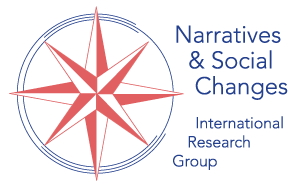III International Workshop on “Methodological Advances and Applications in Social Sciences: Quantitative, Qualitative and Computational New Strategies”
II International Workshop on “Conspiracy Theories and Online Hate Speech Online: Effects on Society and Strategies to counteract them”
24-25 September 2024
The III International Workshop on “Methodological Advances and Applications in Social Sciences: Quantitative, Qualitative and Computational New Strategies” and the II International Workshop on “Conspiracy Theories and Online Hate Speech Online: Effects on Society and Strategies to counteract them” will be held at the University of Huelva on 24 and 25 September 2024.
The Workshop is structured around the following thematic working areas:
- Computational Social Science and Digital Humanities: Theoretical and Methodological Aspects
- Artificial Intelligence for the Analysis of Narratives of Hatred, Conspiracy and Disinformation
- Mixed Methods, Quantitative and Qualitative: Advances and Applications
- Conspiracy theories, online hate speech, and disinformation: Effects on society and strategies to counter them.
DEADLINE FOR SUBMITTING PROPOSALS FOR PAPERS: 5 September 2024.
REGISTRATION, CALL FOR PAPERS AND MORE INFORMATION: https://eventos.uhu.es
DOWNLOAD THE CALL FOR PAPERS: https://eventos.uhu.es/119798/files/iii-international-workshop-on-methodological-advances-and-applications-in-social-sciences-quantitat.html
ORGANISATION:
These Workshops are organized in coordination with the R&D&I project “Conspiracy theories and online hate speech: Comparing patterns in narratives and social networks about COVID-19, immigrants, refugees, and LGTBIQ+ people [NON-CONSPIRA-HATE!]” (Ref. PID2021-123983OB-I00), which is funded by the Spanish Ministry of Science and Innovation, the State Research Agency (DOI: 10. 13039/501100011033) and FEDER/EU, as well as by the research group “Social Studies and Social Intervention” (ESEIS), the research center for “Contemporary Thought and Innovation for Social Development” (COIDESO), the research group “Information and Knowledge Engineering” (I2C), the research centre for “Technology, Energy and Sustainability” (CITES) and the “Applied Computational Social Sciences Laboratory” (CISCOA-Lab), all belonging to the University of Huelva.
Other European entities involved in the organization are the Asociación Andaluza de Sociología (Spain), the Narratives & Social Changes – International Research Group (University of Salerno, Italy), the “Centro de Investigación em Sistemas Ciberfísicos de Algarve” (CISCA) and the “Research Centre for Tourism, Sustainability and Well-being” (CinTurs) of the University of the Algarve in Portugal, the “Centro de Investigação em Educação e Psicologia” da Universidade de Évora (CIEP-UE, Portugal) and the “International Lab for Innovative Social Research” (Universitat de Algarve, Portugal).
FUNDING:
This Workshop is funded by the Andalusian Sociological Association, the R&D&I project “Conspiracy theories, and online hate speech: Comparing patterns in narratives and social networks about COVID-19, immigrants, refugees and LGTBIQ+ people” [NON-CONSPIRA-HATE! ]’ (Ref. PID2021-123983OB-I00), which is funded by the Ministry of Science and Innovation, the State Research Agency (DOI: 10.13039/501100011033) and FEDER/EU. Also, on behalf of the University of Huelva, the research group “Social Studies and Social Intervention” (ESEIS), the research center for “Contemporary Thought and Innovation for Social Development” (COIDESO), and the Research and Transfer Policy Strategy 2024 of the Vice-Rectorate for Research and Transfer.
MORE INFORMATION:
Contact the Workshops organizers by email at nonconspirahate@uhu.es, or nonconspirahate.project@gmail.com
######
Education, Peace, Social Justice
In the footsteps of don Lorenzo Milani
International Conference – 9/10 November, 2023
University of Salerno and city center of Salerno
Don Lorenzo Milani is a reference figure for believers and non-believers alike. In his pastoral and curative activities between Calenzano and Barbiana in Tuscany in the centre of Italy, Don Lorenzo represented a “stumbling block” for his times and a light of hope that reaches our days. An innovator in pastoral work, as witnessed by his Esperienze Pastorali [Pastoral Experiences] of 1958, don Lorenzo was also an acute experimenter in the educational dimension, so much so that he anticipated that pedagogy of hope studied and proposed by Paulo Freire. However, Don Lorenzo Milani was also a peace and non-violence educator, and he bore witness with his life to his way of being on the side of the less privileged in society, even in the dialectical relationship he had with the school institution.
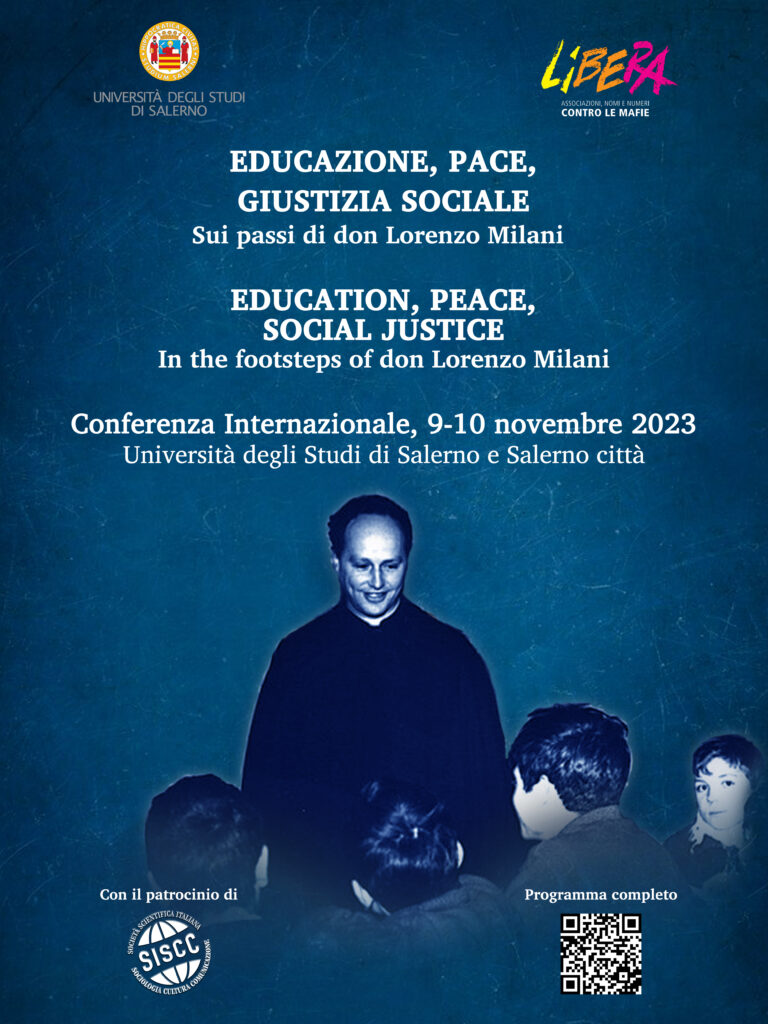
Prof. Emiliana Mangone of the Department of Political Science and Communication of the University of Salerno (DiSPC) and “Libera. Associazioni, nomi e numeri contro le mafie” [Libera. Associations, names and numbers against mafias], in collaboration with prof. Alfonso Amendola (Department of Business Sciences-Management and Innovation Systems/DISA-MIS) and professors from other universities, are promoting and organising an international study conference under the patronage of the Società Scientifica Italiana – Sociologia, Cultura, Comunicazione (SISCC) [Italian Scientific Society – Sociology, Culture, Communication] that intends to focus on the three central perspectives of Don Lorenzo’s reflection and, above all, action 1) the educational dimension, evident in the intuition of the Scuola di Barbiana but already present in the experience of the Scuola Popolare di San Donato in Calenzano 2) the commitment to peace, which finds its most famous moment in the letter to the military chaplains “Obedience is no longer a virtue” but which characterised all of Don Milani’s educational action; 3) pastoral praxis, capable of anticipating the Second Vatican Council and, at the same time, to rejoin the many rivulets of the secular Christian tradition.
The conference will be divided into three moments, linked to each other and in the spirit of Don Lorenzo Milani. The first moment will reflect on the three axes identified as the macro-areas of don Lorenzo Milani’s activities, the second will be a participatory moment for the students of secondary schools in the Province of Salerno, who will be the direct protagonists of a further reflection on don Lorenzo Milani’s ideas, and finally, the third moment that closes the conference will consist of an artistic-literary performance that aims to represent the different imaginaries of don Lorenzo Milani.
######
METHODOLOGICAL ADVANCES AND APPLICATIONS IN SOCIAL SCIENCES
Quantitative, qualitative and computational new strategies
7-8 July 2022 – University of Huelva (Spain) in collaboration with Narratives and Social Changes-International Research Group
Methodological aspects of any research are of transversal interest for the Social Sciences, and the motivation for learning and improving the knowledge of methods, techniques and software applied to social research is common. Therefore, this Workshop is proposed with the idea of sharing methodological innovations in social research with other researchers and diverse applications of methods and strategies in actual research.
Together with the advances and applications in quantitative and qualitative areas in the Social Sciences, on many occasions developed with hybrid designs or mixed methods, due to their current relevance, this Workshop also aims to encourage the presentation and discussion of works where the computational component is essential. More specifically, when programming languages such as R or Python (or others) have been incorporated into the research processes, which require specific programming skills or work in interdisciplinary teams by social scientists.
This I Workshop is co-organized by the Andalusian Association of Sociology (AAS), the Research Center “Social Studies and Social Intervention” (ESEIS), the Faculty of Social Work and the Center for Research in Contemporary Thought and Innovation for Social Development (COIDESO) at the Universidad de Huelva, Spain. Also, this event is co-organized by the Narratives & Social Changes international group – International Research Group (from the University of Salerno, Italy), the Interdisciplinary Center of Social Sciences of the University of Évora (CICS.NOVA.UÉvora), and the Institute of Humanities and Social Sciences (INHUS), a unit dependent on the National Council for Scientific Research (CONICET) and the National University of Mar del Plata (UNMdP) in Argentine.
The Workshop connects with the interests of various projects of these research teams that address, transversally, methodological aspects. The main idea of this Call for papers is to bring together presentations focused on the methodological and technical aspects of their research and the decision processes related to the Methodological strategy. To the extent that many methodological aspects are transversal to Science in general, the Workshop is open to receiving communications from other disciplines whose work may be connected to the methodological challenges present in Sociology, Social Work or other Social Sciences, as well as, in general terms, in Computational Sciences.
More information in English HERE
BETWEEN PAST AND FUTURE: NARRATIVES OF MEMORY
Places, objects and cultures of contemporary society
12 th May 2022 – University of Udine (Italy) in collaboration with Narratives and Social Changes-International Research Group
Starting from the central importance of memory in contemporary societies, the aim of this International Workshop is to encourage a transdisciplinary reflection on how the “presentification of the past” is never a simple re-enactment, but corresponds to the interaction between memory and cultural sensitiveness, present beliefs and needs, expectations and forecasts for the future. The past, even the recent one, is the subject of many academic debates, media narratives, political conflicts and collective mobilizations, artistic expressions, etc., while technological innovations have profoundly changed the practices of conservation and dissemination of collective memory (with particular reference to cultural digitization). The relevance and selection of events, the organization of connections and cross-references between past, present and future, as well as the importance of diversified collective imaginaries, are the keys to narrative constructions of memory that prove to be sensitive and decisive for its continuity, and its intergenerational transmission (DOWNLOAD PROGRAMME).
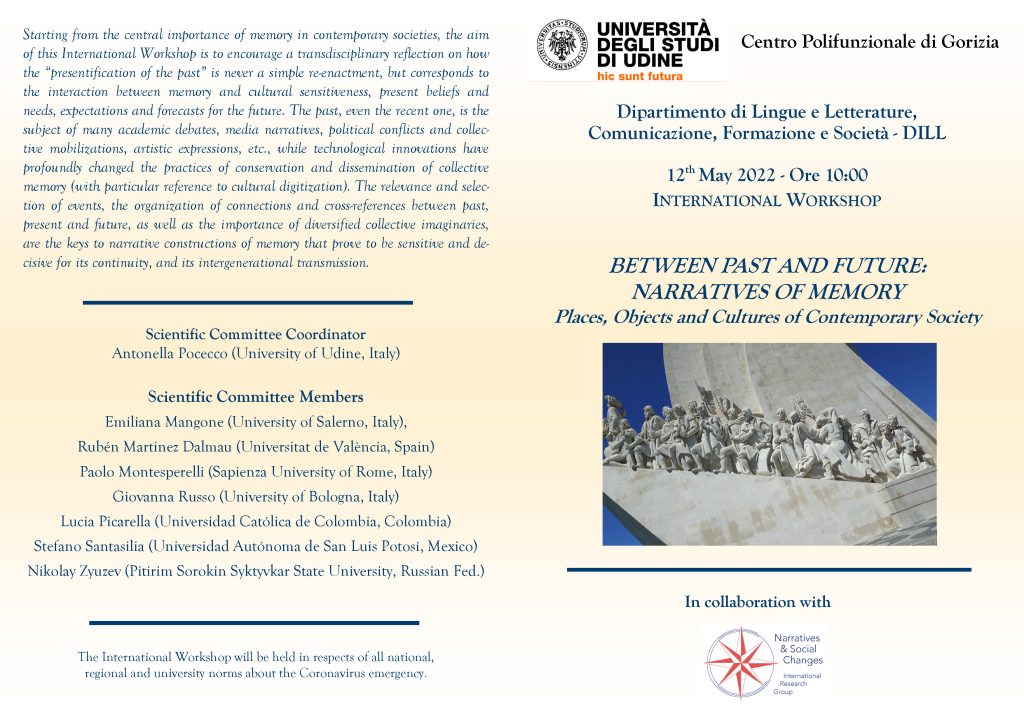
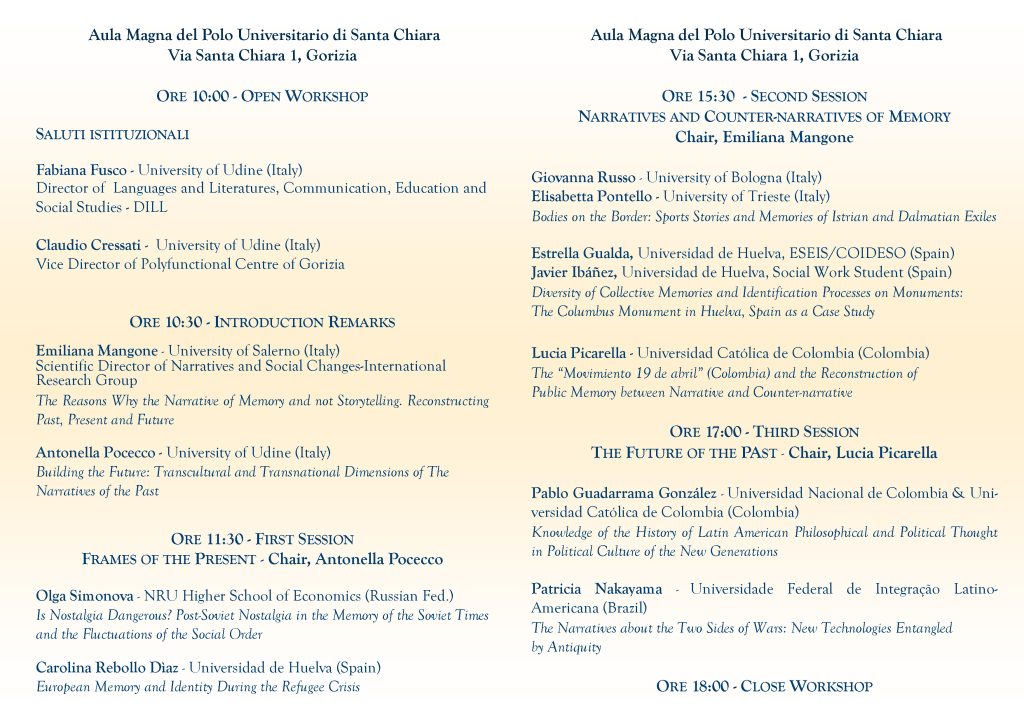
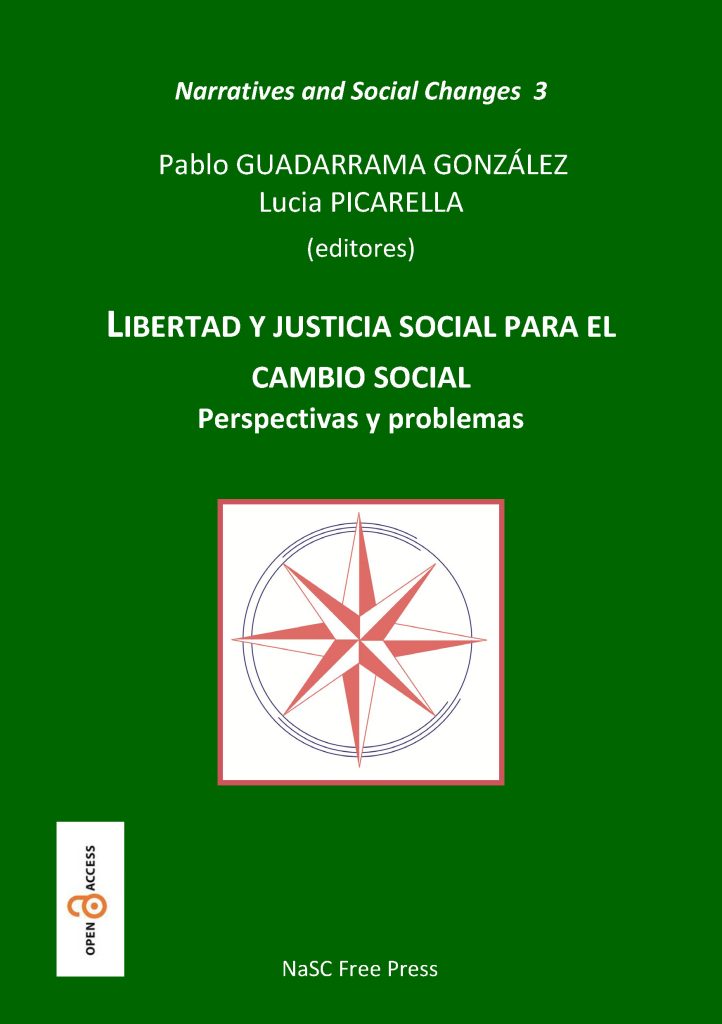
Guadarrama González, P. & Picarella, L. (eds) (2022). Libertad y justicia social para el cambio social. Perspectivas y problemas. Fisciano, Italy: NaSC Free Press. (ISBN: 979-12-80285-04-1; ISBNe: 979-12-80285-05-8; DOI: http://dx.doi.org/10.14273/unisa-4078).
Este volumen es el resultado de los esfuerzos intelectuales de académicos que proceden de instituciones reconocidas a nivel internacional, y que mediante perspectivas interdisciplinarias y multidisciplinarias crean puentes interoceánicos. Promovido por el Narratives and Social Changes-International Research Group (Università degli Studi di Salerno) el volumen ofrece una panorámica sobre los logros y avances conquistados por los pueblos en la lucha por la libertad y la justicia social, y demuestra los aportes, desde diversos enfoques ideológicos, de intelectuales, escritores, pensadores, organizaciones, instituciones, movimientos sociales, comunidad etc., en la elaboración de propuestas teóricas y acciones prácticas en función de cambios promotores de mayores grados de libertad y de justicia social. El volumen representa una oportunidad para reflexionar sobre los resultados alcanzados, pero también pretende impulsar debates y estudios sobre la construcción de modelos alternativos necesarios para enfrentar los nuevos retos que se interponen en el largo camino hacia la libertad y la justicia social.
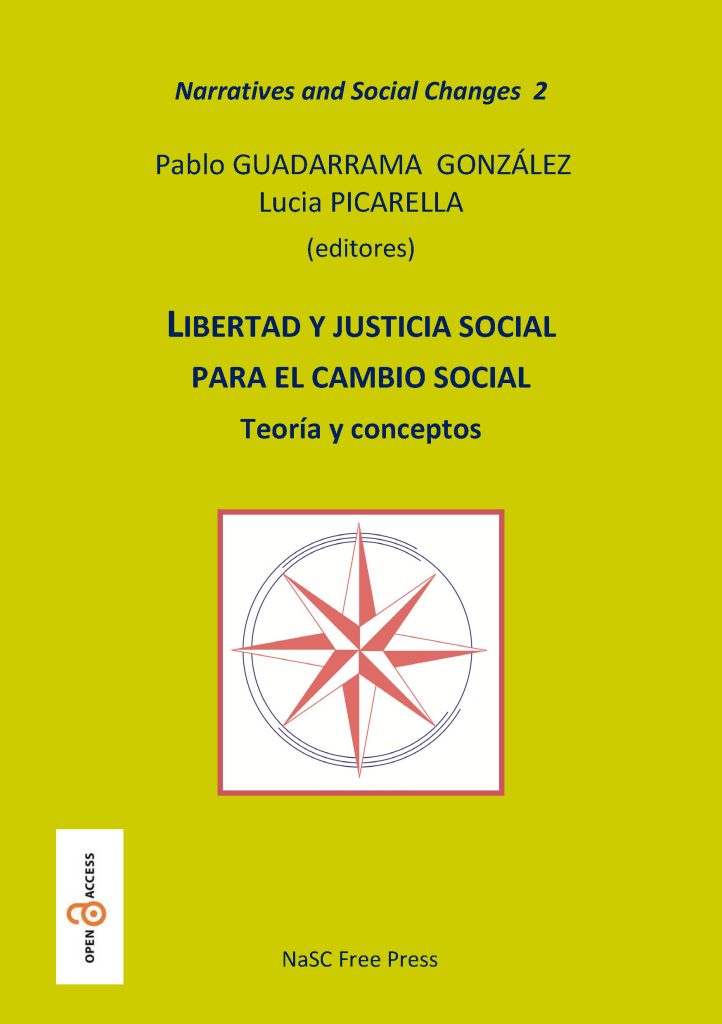
Guadarrama González, P & Picarella, L. (eds) (2022). Libertad y justicia social para el cambio social. Teoría y conceptos. Fisciano, Italy: NaSC Free Press. (ISBN: 979-12-80285-02-7; ISBNe: 979-12-80285-03-4; DOI: http://dx.doi.org/10.14273/unisa-4077).
El presente volumen auspiciado por el Narratives and Social Changes-International Research Group (Università degli Studi di Salerno) recoge las contribuciones de colegas de varios países que han investigado desde diferentes disciplinas académicas esenciales problemas teóricos y conceptuales sobre la libertad y la justicia social fundamentalmente desde la construcción de la modernidad hasta la actualidad. Entre los principales temas objeto de análisis se encuentran: la relación entre determinismo y libertad; la rehumanización y la responsabilidad social; los retos ante el totalitarismo; la interdependencia entre libertad, justicia social y cultura; la libertad y justicia en el intercambio Informativo; la justicia en la globalización; los contextos de justicia, sufrimientos y luchas sociales; el papel del filósofo en las luchas sociales; la justicia y libertad en el pensamiento filosófico político alemán; los derechos económicos, sociales y culturales para la transformación social: la posibilidades y límites del poder constituyente ante la justicia social.
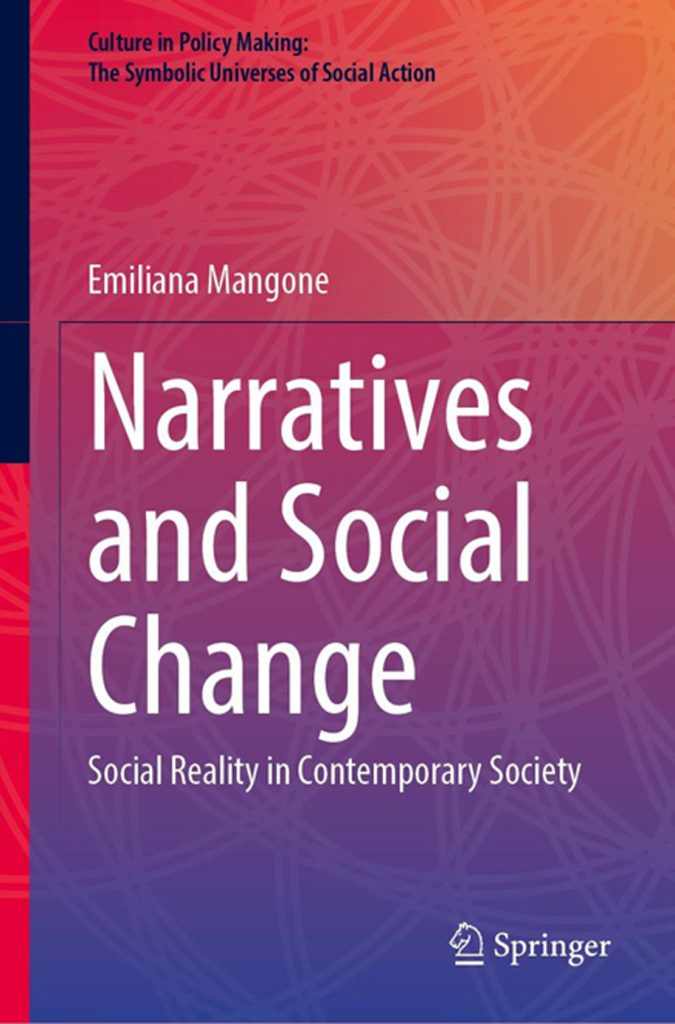
Mangone, E. (2022). Narratives and Social Change. Social Reality in Contemporary Society. Springer Nature, Switzerland (ISBN: 978-3-030-94564-0; ISBN: 978-3-030-94567-1; ISBNe: 978-3-030-94565-7; DOI: https://doi.org/10.1007/978-3-030-94565-7).
This book is an important contribution to narrative research and highlights how narratives can produce social change. The author demonstrates this through an analysis of concepts like future, uncertainty and risk, both in terms of individual impact and as collective forms of social life. The book reconstructs the relationships between future, uncertainty and risk through everyday how narratives exert power over individual and social life by influencing individual or collective decisions and choices. Narratives also change future prospects, thus producing social change. Some of the examples the author draws out for discussion are – in specific – the narration of the migration flows in the Mediterranean Sea, and the narration of the pandemic emergency from COVID-19. The result of different narratives has been the emergence of new ideologies and of a complex series of dynamics in which the local ends up becoming global and vice versa.
CALL FOR PAPERS – International Workshop
12th May 2022 (if necessary we will add the morning of 13th)
BETWEEN PAST AND FUTURE: NARRATIVES OF MEMORY. Places, objects and cultures of contemporary society
Organized by the Department of Languages and Literatures, Communication, Education and Society (DILL) of University of Udine (Italy) in collaboration with the Narratives and Social Changes-International Research Group (NaSC-IRG)]
Full Call for Papers (Download here) – March 31, 2022
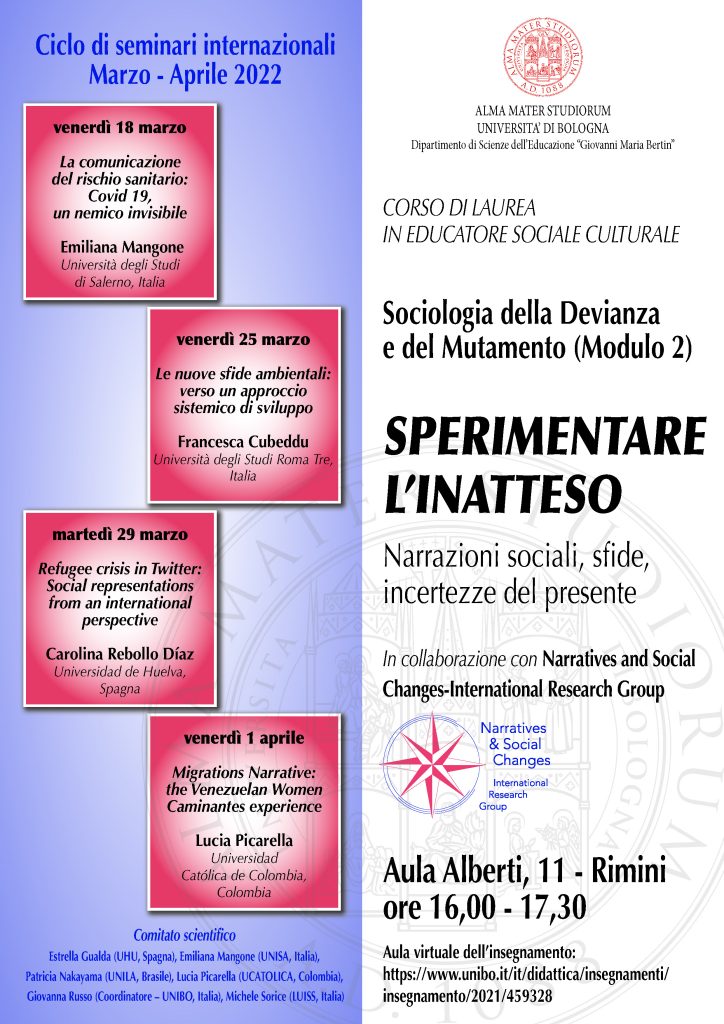
SPERIMENTARE L’INATTESO. Narrazioni sociali, sfide, incertezze del presente
University of Bologna (Italy), March-April 2022
A cycle of international seminars that aims to tackle some of the issues facing contemporary society (narrative, migration and sustainable development) with a theoretical-empirical approach.
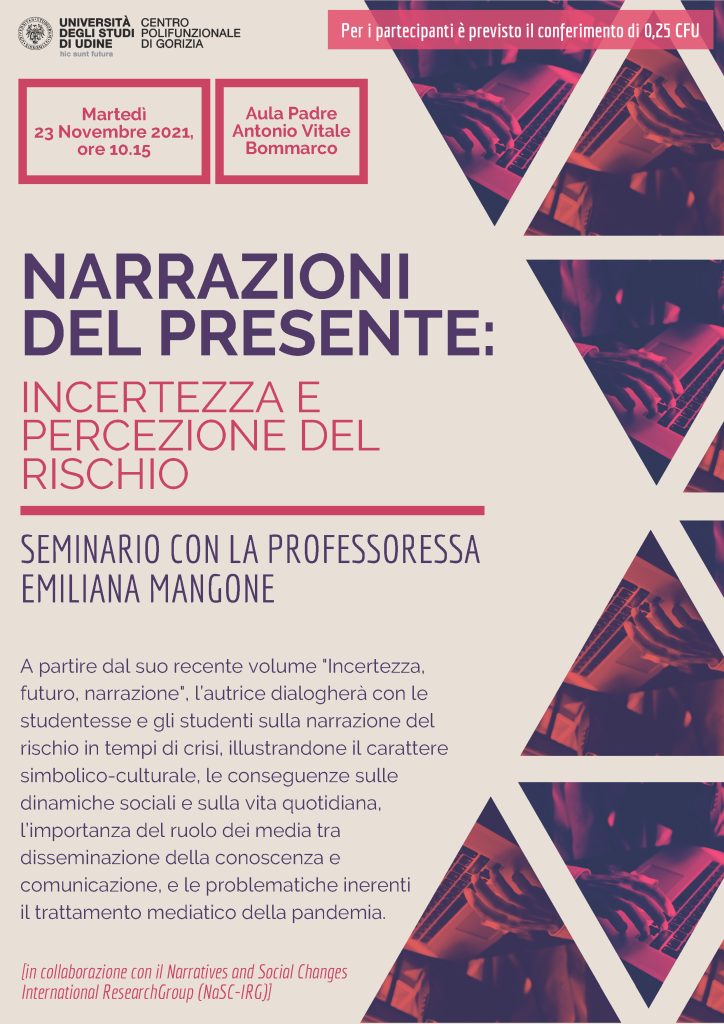
Narrazioni del presente: incertezza e percezione del rischio
University of Udine (Italy), 23 November 2021
Starting from the book, Incertezza, futuro, narrazione, Emiliana Mangone will discuss with the students the narrative of risk in times of crisis, illustrating its symbolic-cultural character, the consequences on social dynamics and daily life, the importance of the role of the media between dissemination of knowledge and communication, and the problems inherent in media treatment of the pandemic.
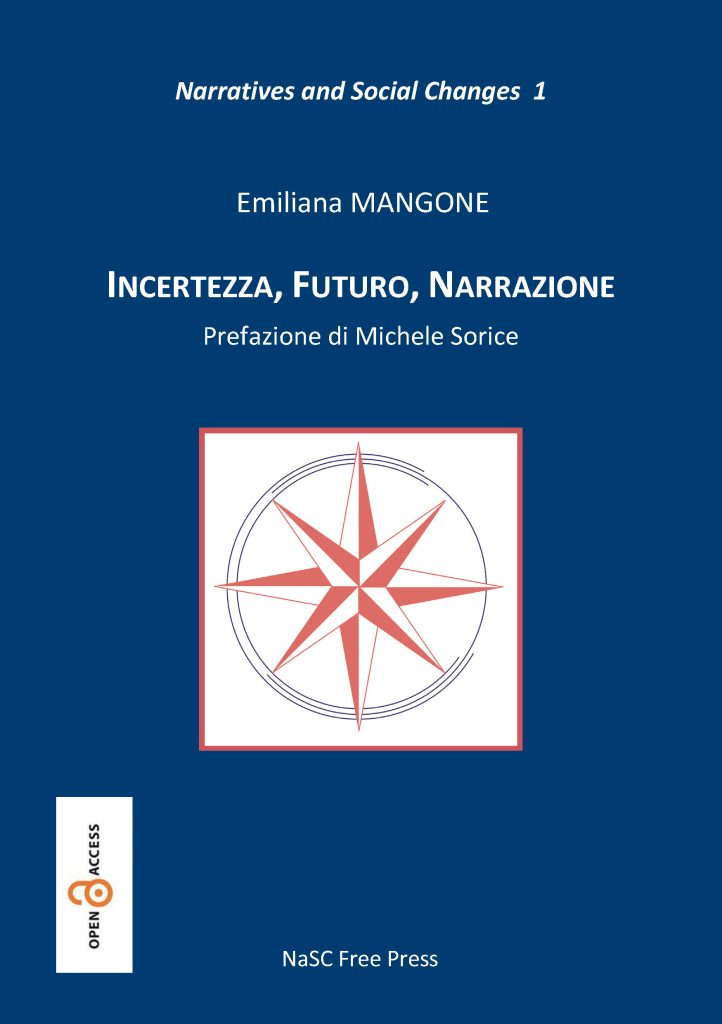
Mangone, E. (2021). Incertezza, futuro, narrazione. Fisciano, Italy: NaSC Free Press. (ISBN: 979-12-80285-00-3; ISBNe: 979-12-80285-01-0; DOI: http://dx.doi.org/10.14273/unisa-1437).
I disastri e le modalità attraverso cui l’umanità può trovare il suo sviluppo dirigono la riflessione inevitabilmente verso una lettura sociologica dei fenomeni socioculturali, alla “cultura del rischio” e alla coscienza dei rischi corsi come mezzo attraverso cui “colonizzare il futuro”. Alla luce di ciò, il volume affronta alcune questioni che sono emerse in forma emergenziale con la pandemia da COVID-19 (la percezione del rischio e del futuro, la comunicazione e la narrazione, la responsabilità, ecc.) ritenendo che tutti questi processi non influenzano solo la costruzione della realtà sociale ma assumono un ruolo prioritario nella costruzione, identificazione e selezione dei rischi. L’idea è quella di delineare un percorso di riflessione su aspetti simbolo-culturali che permetta l’esplorazione dei processi che si attuano su piani differenti (individuale, sociale e culturale) ogni qualvolta gli individui si trovano a fare esperienza di un’emergenza o a far fronte a un rischio. Il libro consta di due parti, una prima di inquadramento teorico che “gioca” coi modelli e con le loro applicazioni al rischio e alle narrazioni sociali dell’incertezza (cfr. Prefazione di Michele Sorice), e una seconda parte, in cui il risultato del “gioco” è chiaramente evidenziato nell’analisi sulla narrazione e gli stili comunicativi del rischio sanitario.
SN SOCIAL SCIENCES (published by Springer Nature) – Deadline May 2021
Narrative, Emotions, and Social Change between Global and Local Space
Editors: Emiliana Mangone (Department of Political and Communication Sciences, University of Salerno, Italy); Adrian Scribano (CONICET, Instituto Gino Germani, FACSO, Universidad de Buenos Aires, Argentina)
Scope: Narrative is a powerful tool in the life of individuals that determines their decisions and also their imagination of the future. This collection aims to bring together theoretical, empirical and interdisciplinary research exploring how narrative can contribute to producing social change – either locally or more widely.
Narrative is part of social life and, most of the time, the narrative with all its implications is based on the same subject: the individual who builds the narrative and the one who tells it are the same subject. In this context, social changes are linked to the emotions and sensibilities expressed by the narratives: collectives and individuals elaborate a set of emotions associated with goals, causes, ideologies, social practices that support, justify, or reject social changes, conservative resistance and/or social restructuring processes.
Therefore, narrative takes two forms: a) mode of knowing and b) mode of communication. Since the first form allows for the development of systems of ideas and the second for their diffusion, it is clear that narrative plays a central role in promoting social change.
The article collection welcomes research from across all disciplines in the social sciences, including qualitative and quantitative methods, as well as purely theoretical contributions. Potential questions to be asked include, but are by no means limited to, the following: What is meant by narrative? How are narrations and emotions connected? And what use do individuals and collectives make of it? Who builds the story? And above all who tells it and how is it told?
We encourage submissions that focus on, but are not limited to, the following topics:
- Narrative and research methods;
- Narrative, means and forms;
- Social movements, sensibilities and narratives;
- Narrative and social change;
- Narrative and emotions;
- Politics, emotions and narrative;
- Narrative and rights;
- Narrative and women.
This is a rolling collection and as such we welcome submissions until the end of May 2021. Authors who wish to discuss ideas for articles are asked to directly contact the guest editors (emangone@unisa.it) before submission. Full papers (original or review) must be submitted via the journal’s submission system. Submissions by email cannot be accepted.
